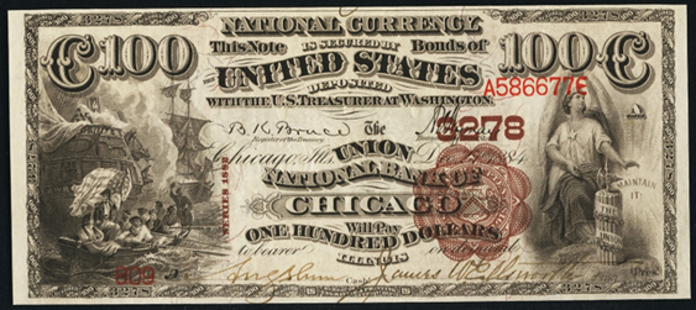One Hundred Dollar Notes › Nationals › 1882 One Hundred Dollar National Bank Notes › North Carolina Charters › 1882 $100 Raleigh North Carolina National Bank Of Raleigh
Get Value Now
| Item | Info |
|---|---|
| Series | 1882 |
| Charter | #3389 National Bank of Raleigh of Raleigh, North Carolina |
| Year Chartered | 1885, 146 Banks Chartered |
| City Info | Raleigh is the capital of the state of North Carolina and the seat of Wake County in the United States. Raleigh is the second largest city in the state of North Carolina behind Charlotte. Raleigh is known as the "City of Oaks" for its many oak trees, which line the streets in the heart of the city. The city covers a land area of 142.8 square miles. The U.S. Census Bureau estimated the city's population as 451,066 as of July 1, 2015. It is one of the fastest-growing cities in the country. The city of Raleigh is named after Sir Walter Raleigh, who established the lost Roanoke Colony in present-day Dare County. Source: Wikipedia |
| Similar Cities | If your note doesn't match try: 1. Raleigh, North Carolina - Raleigh National Bank of North Carolina 2. Raleigh, North Carolina - State National Bank 3. Raleigh, North Carolina - Citizens National Bank |
| Seal Varieties | Brown, Blue |
| See Also | If your note doesn't match try: 1. 1882 $100 Gold Certificate 2. 1878 $100 Legal Tender 3. 1880 $100 Legal Tender |
| Other Info | 1. Value depends on notes known for charter, condition and market demand. 2. Rare and highly desirable National Note. |
| Neat Fact | Full and partial sheets of National Bank Notes are known to exists. Families of bank officials, particularly those who signed the notes, kept them as keepsakes. Some sheets are extremely valuable. Others are more common. |
No Obligations Offers and Appraisals
Please submit a good photo or scan. It will be identified and evaluated. Understand there may be subtle differences between the image you see above and your note. Signatures, design, markings and note condition will determine the offer price. Notes in Uncirculated or better condition receive the best offers.
Appraisals can be estimated for wholesale and retail prices. Wholesale is what dealers typically pay. Retail is what a collector might pay. Retail is slightly higher in most cases.
Please visit this page for USA Paper Money Reference. Do not treat this page as a reference guide, it is for appraisal and acquisition purposes only.
